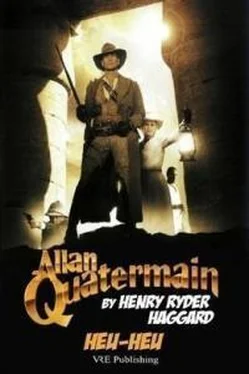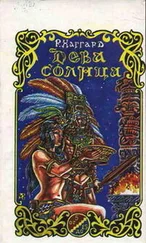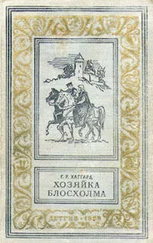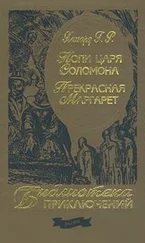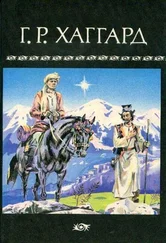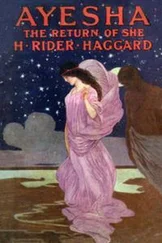The place was lonesome and eerie, a horrible place with the pit full of bones near by; heavily silent also except for a distant hyena or jackal howling at the moon, and I had gone through some trials that day—the passage of the death–pit, for instance, which reminded me of the oubliettes in ancient Norman castles that I have read of down which prisoners were hurled to doom. Also, as you may have observed, even in your short career, moonlight differs from sunlight and we, or some of us, are much more affected by horrible things at night than we are by day. At any rate, I sat down because I felt faint and thought that I was going to be ill.
"What is it, Baas?" queried the observant Hans, still mocking. "If you want to be sick, Baas, please don't mind me, for I'll turn my back. I remember that I was sick myself when first I saw Heu–Heu—just there," he added reminiscently, pointing to a certain spot.
"Why do you call that thing 'Heu–Heu,' Hans?" I asked, trying to master the reflex action of my interior arrangements.
"Because that is his nice name, Baas, given him by his Mammie when he was little, perhaps."
(Here I nearly was sick, the idea of that creature with a mother almost finished me—like the sight and smell of a bit of fat bacon in a gale at sea.)
"How do you know that?" I gurgled.
"Because the Bushmen told me, Baas. They said that their fathers, a thousand years ago, knew this Heu–Heu far away, and that they left that part of the country because of him as they never slept well at night there, just like a Boer when another Boer comes and builds a house within six miles of him, Baas. I think they meant that they heard Heu–Heu when he talked, for they told me that their great–great– grandfathers could hear him doing it and beating his breast when he was miles away. But I daresay they lied, for I don't believe they really knew anything about Heu–Heu, or who painted his portrait on the rock, Baas."
"No," I answered, "nor do I. Well, Hans, I think I have had enough of your friend Heu–Heu for this evening, and should like to go back to bed."
"Yes, Baas, so should I, Baas. Still, take another good look at him before you leave. You don't see a picture like that every night, Baas, and you know you wanted to come."
Now I would have kicked Hans again, but luckily I remembered those nails in his pocket in time, so, after one lingering glance, I only rose and loftily motioned to him to lead on.
This was the last that I saw of the likeness of Heu–Heu or Beelzebub, or whoever the monster may have been. Somehow, although I intended to return to examine it more closely by the light of day, when morning came I thought that I would not risk another scramble over that ledge but would be satisfied with the memory of first impressions. These they say, are always the best—like first kisses, as Hans added when I explained this to him.
Not that I could forget Heu–Heu; on the contrary, it is not too much to say that this devilish creature haunted me. I could not dismiss that picture as some mere flight of distorted savage imagination. From a hundred characteristics I knew or thought I knew it, erroneously as I now believe, to be Bushmen's work and was certain that no Bushman, even if he had delirium tremens —not a complaint from which these people ever suffered, because they lacked the opportunity of doing so, could have evolved this monstrous creation out of his own soul—if a Bushman has a soul. No, Bushman or not, that artist was drawing something that he had seen, or thought that he had seen.
Of this there were several indications. Thus, on Heu–Heu's right arm the elbow joint was much swollen as though he had once suffered an injury there. Again, the claw of one of his horrible hands—the left, I think—was broken and divided at the point. Further, there was a wart or protuberance upon the brow, just beneath where the long iron– gray tufts of hair parted in the middle and hung down on each side of the demoniacal, womanish face. Now the painter must have remembered these blemishes and set them down faithfully, copying from some original, real or imagined. Certainly, I reflected, he would not have invented them.
Where, then, did he get his model? I have mentioned that I had heard rumours of creatures called Ngolokos , which I took it, if they existed at all, were peculiarly terrific apes of an unknown variety. Heu–Heu, then, might be a most distinguished and improved specimen of these apes. Yet that could scarcely be, for this beast was more man than monkey, notwithstanding his huge claws where the thumbs and big toes should be. Or perhaps I should say that he was more devil than either.
Another idea occurred to me: he might have been the god of these Bushmen, only I never heard that they had any god except their own stomaches. Afterwards I questioned Hans on this point but he replied that he did not know, as the Bushmen he lived with in the cave had never told him anything to that effect. It was true, however, that they did not go to the place where the picture was except through fear of enemies, and that when they did they would not look or speak about it more than they could help. Perhaps, he suggested with his usual shrewdness, Heu–Heu might be the god of some other people with whom the Bushmen had nothing to do.
Another question—when was this work executed? Owing to its sheltered position the colours were still fairly bright, but it must have been a long while ago. Hans said that the Bushmen told him that they did not know who painted it or what it represented, but that it was " old, old, old! " which might mean anything or nothing, since to a people without writing five or six generations become remote antiquity. One thing was certain, however, that another of the paintings in the cave was undoubtedly old, that of the Phoenicians raiding a kraal of which I have spoken, which can scarcely have been executed since the time of Christ. Of this I am sure, for I examined it carefully on the following morning and it was not more faded than that of the Monster. Further, in this picture a piece of the rock had scaled off just above the left knee, and I had noticed that the surface thus exposed seemed as much weathered as that of the surrounding rock outside the limits of the painting.
On the other hand, it must be remembered that the Phoenician picture was under cover, while that of Heu–Heu was exposed to the air and would therefore age more rapidly.
Well, all that night I dreamed of this horrid Heu–Heu, dreamed that he was alive and challenging me to fight him, dreamed that someone was calling to me to rescue her—it was certainly her—not him—from the power of the beast; dreamed that I did fight him and that he got me down and was about to twist my head off as he had done to the man in the picture, when something happened—I do not know what—and I woke up covered with perspiration and in a most pitiable fright.
Now at the time I visited this cave I was not far from the borders of Zululand on one of my trading expeditions, the wagon being laden with blankets, beads, iron pots, knives, hoes, and such other articles as the simple savage loves, or in those days loved to pay for in cattle. Before the storm overtook us, however, I was contemplating leaving the Zulus alone on this trip and trying to break new ground somewhere north of Pretoria among less sophisticated natives who might put a higher value on my wares. After seeing Heu–Heu, as it chanced, I changed my mind for two reasons. The first of these was that the lightning had killed my two best oxen and I thought that I could replace these without cash expenditure in Zululand, where debts were owing to me that I might collect in kind. The second was connected with that confounded and obsessing Heu–Heu. I felt convinced that only one man in the world could tell me about this monster, if, indeed, there were anything to tell, namely, old Zikali, the wizard of the Black Kloof, the Thing–that–should–never–have–been–born , as Chaka, the great Zulu king, named him.
Читать дальше
